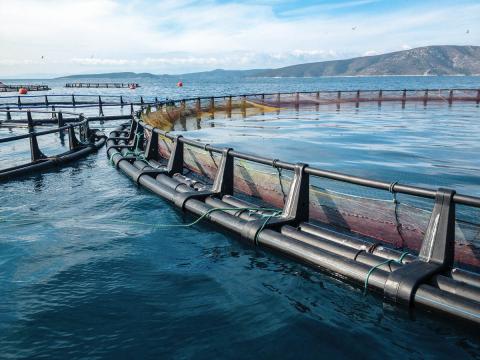At this level of job, you will lead a small team in daily operations on site, usually working under the direction of the Assistant Site Manager or Site Manager. The focus will be on successful fish production, including feeding, grading, harvesting, net changing and other general farm maintenance tasks, including boat handling.
Freshwater fish are kept in tanks, ponds, cages, or concrete raceways. Sea fish are usually housed in sea cages or large pens. Shellfish are farmed in their natural marine environment; for example, mussels are reared on ropes hanging in the sea.
In salmon farming, the fish are bred in fresh water for six months to two years, and then transferred to pens in the sea until they are mature and ready to sell.
Working Conditions
Fish farms operate seven days a week, so farmers usually work flexible hours based around the jobs that need completing at different times of the year. In larger farms, they are likely to work on a rota system with other members of staff. This will include early mornings, evenings and weekends. There may be opportunities for both full-time and part-time working.
You need to be comfortable working over water and willing to do flexible hours to meet the demands of the job. This may include overtime and weekend cover, usually in a rota.
Most working time is spent outdoors in all weathers. Many fish farms are in relatively remote sites, but housing is often provided with the job. The work itself is active and involves a lot of heavy lifting, standing, bending and carrying.
Fish farmers may need to collect feed or equipment and make deliveries of fish, so a driving licence is needed.
Salary
Salaries vary with experience, qualifications and between companies, but here's a guide to what you can expect.
£17,000
£22,000
Getting started
Relevant qualifications
Experience is an advantage, but training is usually provided.
What employers are looking for
- communication and planning skills
- IT
- boat handling skills
- ability to manage and work with others.
What experienced workers can do
- Breed fish, either by hatching eggs from adult fish or buying in young fish and rearing them
- Feed fish by hand or by filling hoppers that feed the fish automatically. Shellfish feed naturally from the sea
- Grade fish or shellfish by size and moving them to bigger tanks or other holding units
- Maintain water quality through regular checks on water temperature and oxygen content.
- Monitoring the health of fish, treating those that show signs of infection or disease
- Harvesting fish for eating and sale
Personal qualities you should have
- Good time management
- Working alone
- Able to use initiative
- Attention to detail
- Able to solve problems
Next steps
There may be opportunities for fish farm technicians to be promoted to assistant manager or manager in larger fish farms. As there are a limited number of jobs, you may have to move elsewhere to progress in your career.
Some fish farmers, with relevant skills and experience, start up their own farms or move into scientific or technical work, such as research. There are sometimes opportunities to work abroad.
Industry links
Scottish Salmon Producers Organisation
